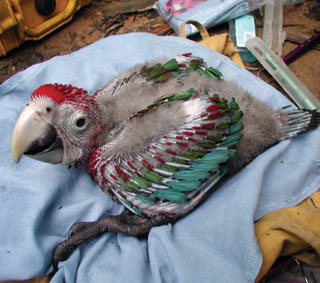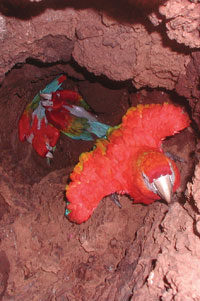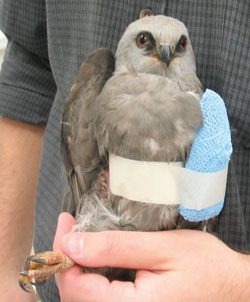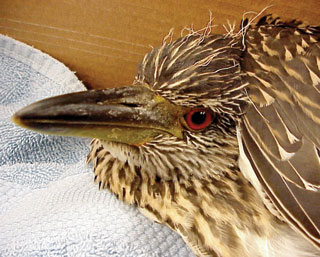 The Schubot Center for Avian Health at the VMBS was founded in 1987 by an endowment from Mr. Richard M. Schubot with matching funds provided by Texas A&M University. Faculty members associated with the center conduct more research into avian health and conservation and train more veterinarians interested in avian medicine than any other veterinary college in the nation.
The Schubot Center for Avian Health at the VMBS was founded in 1987 by an endowment from Mr. Richard M. Schubot with matching funds provided by Texas A&M University. Faculty members associated with the center conduct more research into avian health and conservation and train more veterinarians interested in avian medicine than any other veterinary college in the nation.
With so few avian veterinarians, and the national numbers decreasing, the VMBS continues to retain and recruit the best and the brightest students and faculty, while seeking to improve the facilities and tools needed to enhance the care provided for these special creatures.
Teaching
The primary function of the VMBS is teaching. We have a responsibility to teach future veterinarians about avian diseases, their diagnosis, prevention, and treatment. This is especially important for those students, interns, and residents who have a specific interest in exotic animals and birds. Teaching, especially when accompanied by ongoing programs in conservation and disease research, is especially effective and something that the Schubot Center faculty are committed to improving.
 Research
Research
The center supports research into all aspects of disease in wild and captive birds. We are especially interested in the large parrot species but do not ignore other endangered species, raptors, and waterfowl. As a school of veterinary medicine, our focus centers on infectious and parasitic diseases, but we are also investigating the genomes and genetic diversity of several important bird species, and conducting research on avian nutrition and behavior. These projects involve not only scientists at the VMBS but also in the Department of Wildlife and Fisheries Science as well as other universities in the United States, Canada, and Central and South America. The results of our studies are already being applied to improving the health of birds kept by zoos, aviculturists, and individual pet owners. The Schubot Center research programs are specifically selected for their importance to the avicultural and conservation communities and include international collaborations in Peru, Argentina, Costa Rica, and Honduras.
Our accomplishments include:
- treatments for iron-storage disease,
- improved diagnosis of avian tuberculosis, avian bornavirus, and avian herpesvirus, and
- development of a test that has eliminated an inherited disease in California condors.
Our faculty is also actively engaged in long-term studies on macaw biology and disease at our research site at Tambopata, Peru. Members of the center staff are leaders in the fields of wild parrot research and conservation, through studies of salt licks, macaw nesting success, wild parrot nutrition, and satellite telemetry.
Help Us Maintain a Proper Space for Success
The accomplishments of the Schubot Center have been achieved through the support of the school and university and because of the hard work of faculty, staff, and students. However, new facilities, specifically the Avian Health Center, which has allowed us to achieve even greater success, come with associated costs.
As our program grows and diversifies, having the ability to house a larger population of birds helps us continue important research and begin new studies. We have a climate-controlled space now and it makes the Texas summers more comfortable for our birds and allows them to be less stressed during studies.
 Our major research program into the prevention and treatment of proventricular dilatation disease involves studies on birds infected with avian bornavirus. We have the needed facilities now for these birds to be kept separate from healthy birds or birds used for other studies and it greatly benefits this important research.
Our major research program into the prevention and treatment of proventricular dilatation disease involves studies on birds infected with avian bornavirus. We have the needed facilities now for these birds to be kept separate from healthy birds or birds used for other studies and it greatly benefits this important research.
We have appropriate space to house raptors now, and so we can better train students in the care and treatment of these important birds. We are able to provide a state-of-the-art washroom and changing facility now, and it ensures the health and safety of our students, faculty, and staff.
Finally, we have dedicated teaching space now, and so we can better promote an understanding of avian diseases and avian husbandry among future veterinarians.
The Avian Health Center
Project imperatives for the Avian Health Center included:
- Provide an ample, comfortable, and safe environment for birds
- Afford infected and healthy birds appropriate, separate space
- Build a facility with suitable quarantine capabilities
- Enrich the learning environment of tomorrow’s veterinarians
- Meet the advanced research resource needs of our faculty
The VMBS is reaching out to our friends and supporters who have expressed an interest in avian health, conservation, and care. We are seeking funding in the total amount of $2.2 million to support the cost of our Avian Health Center. This facility allows Texas A&M University, through the Schubot Center for Avian Health, to build upon the VMBS’ leadership in the fields of avian health and conservation. We’re honored and pleased to provide this proposal to you as an opportunity to partner with us as we move forward to maintain and enhance the most comprehensive teaching, research, and clinical service program with regard to pet, wild, and exotic birds in the nation.
Donor Naming Opportunities
| Avian Health Center | $1,000,000 |
| Hospital | $200,000 |
| Healthy Bird Aviary (2) | $150,000 each |
| Abnormal Bird Aviary (2) | $150,000 each |
| Pet Aviary | $100,000 |
| Classroom/Conference Room | $100,000 |
| Clinical Laboratory | $50,000 |
| Biosafety Level 2 Aviary (3) | $25,000 each |
| Quarantine Room (3) | $25,000 each |
| TOTAL | $2,200,000 |
Impact
 Birds and other exotic species of animals have not always received the level of veterinary care afforded to more mainstream pets like dogs and cats. Indeed, the veterinary profession has tended to avoid the broader issues of conservation, the trade in endangered species, and the imminent extinction of many species. The Schubot Center for Avian Health is a leader in changing this paradigm in the veterinary profession.
Birds and other exotic species of animals have not always received the level of veterinary care afforded to more mainstream pets like dogs and cats. Indeed, the veterinary profession has tended to avoid the broader issues of conservation, the trade in endangered species, and the imminent extinction of many species. The Schubot Center for Avian Health is a leader in changing this paradigm in the veterinary profession.
The School of Veterinary Medicine & Biomedical Sciences (VMBS) will continue to make instruction in the treatment of birds and other exotics a focus for our students, as well as providing the most appropriate facilities, research opportunities, and tools to assist this process. No other school of veterinary medicine in the country devotes such resources to educating and training future avian veterinarians.
We’re committed to remaining the recognized leader in providing the highest level of care to the many avian patients presented at our clinic each year. Unfortunately, avian health and conservation is not an area that attracts significant levels of extramural grants or federal funding, and the center must compete with many other demands on the resources of the school. Private funding is a key factor in ensuring the continuation and success of the center.
The Avian Health Center is approximately 11,000 square feet and has been designed for easy expansion should future needs and funding be available. The Avian Health Center contains a functional hospital, receiving area with quarantine capabilities, two isolation rooms, a Biosafety Level 2 (BL2) laboratory for infectious disease research, spacious teaching and classroom space, and four offices.
Contributing to the Avian Health Center at the Schubot Center for Avian Health at the Texas A&M VMBS makes you a member of the team working to make the future of avian veterinary medicine a priority around the world.
